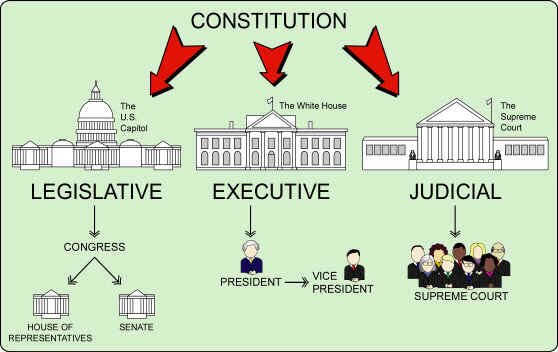Overcoming Limitations
As was the original intent of the Framers of the Constitution, the executive branch is not the most important branch of government in the U.S.A. The executive branch was designed to have enough power and independence to fulfill its responsibilities but not enough so that it could be abused. It was very important to establish an executive branch strong enough to balance the power of the legislature but not endanger democratic government. It was also decided a single leader would be more effective (and easier to oversee) than dual parties. I believe for the most part, they were successful. It is necessary that we have a single leader to represent our country not only within our nation but to the outside world as well. Executive powers include enforcing laws made by Congress, nominating people for federal offices, negotiating treaties with foreign nations, and conducting wars. However, the fact that the legislative branch creates the laws that govern our lives has the most important impact to the American citizens. Although the President shares in the legislative power through the veto which he has the power to perform, a bill can still become a law if two-thirds of both houses of Congress vote to override the veto. In the same way, although the President has the power to nominate executive officials and federal judges, the Senate has the right to approve or disapprove of the nominees selected. The power to make treaties with foreign nations is also shared, the President has the power to negotiate a treaty but it most be approved by a two–thirds senate vote. These are all examples of the limits of the President and the executive branch itself. In every example the legislative branch has the final say.
An exception to my stance that the legislative branch has the final say is evident in my first example of a Presidential accomplishment which all branches agreed upon. When George W. Bush signed the USA Patriot Act into law on October 26, 2001, it was a surprising and remarkable testament to cautious and unconventional times. Having just endured the tragedy of 9/11, the country and our leaders were treading lightly, afraid of another terrorist attack and desperate for measures to hopefully increase security for the American public. What resulted was a controversial act that tested the very civil liberties we have protected so strongly. Some, but not all, areas of controversy were indefinite detention of immigrants, law enforcement searches of homes and businesses without the owner’s permission or knowledge, and expanded FBI searches of telephone, email and financial records. Some of these provisions, when later challenged, were proved unconstitutional by Federal courts! Although President Bush enjoyed a Republican majority Congress at that time, it is still surprising that the Democrats, usually known more as idealists interested more in foreign affairs than National Security, were on board as well. This was a tremendous success for George Bush who made the comments at the time, “America will never seek a permission slip to defend the security of our people." and "Our greatest responsibility is the active defense of the American people."
Although Democratic President Bill Clinton did not intend to master a Republican Congress by the expanded use of his veto power, he was eventually forced to adapt his legislative relationship to achieve his political goals. Clinton vetoed thirty-five bills (excluding pocket and line-item vetoes) from 1995-2000. Republican leaders challenged eleven of the thirty-five vetoes in at least one of the chambers but managed to override the president only once. Further, Clinton relied on ‘veto threats’ on over 140 bills and was generally successful in stopping the Republicans’ agenda or achieving policy concessions from the majority leadership in most cases. President Clinton developed the ability to manipulate “partisan disagreement” by using the executive right to veto to minimize executive-legislative conflict. He used what executive power he was entitled to (the veto), to accomplish the greatest goals and was probably the most successful president historically to achieve his ‘hoped for’ legislative outcomes in this manner.
http://www.boycottliberalism.com/Bush-quotes.htm
http://www.fas.org/irp/crs/RS21203.pdf
www.lifeandliberty.gov/highlights.htm
usgovinfo.about.com/cs/thepresident/a/radio041704.htm
http://web.clas.ufl.edu/users/rconley/Clintonvetoespaper.pdf



